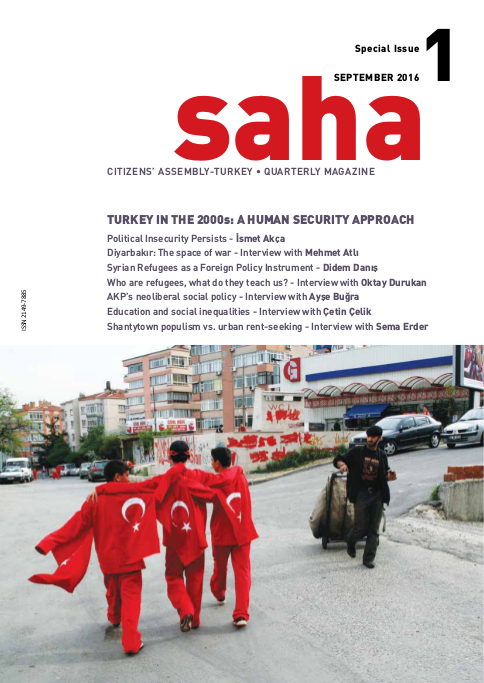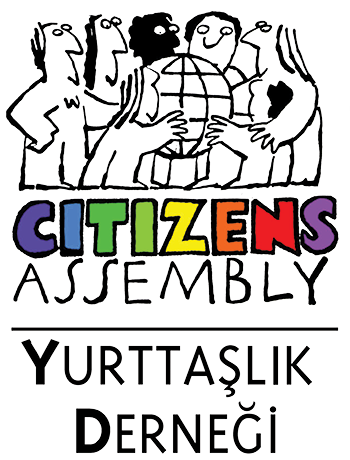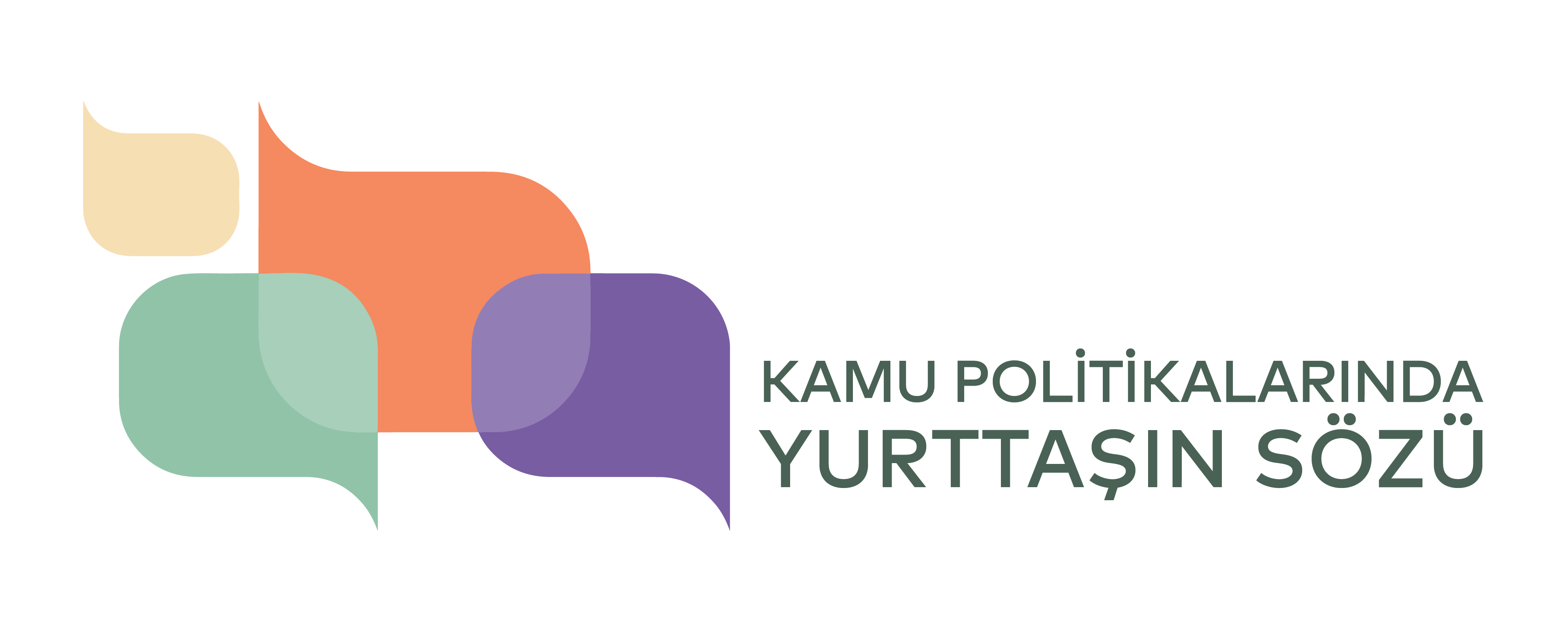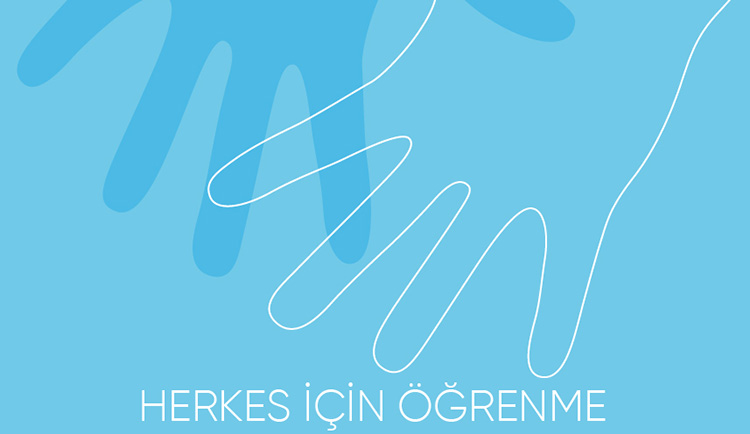
saha (English) Issue 1: Turkey in the 2000s - A Human Security Approach
Editorial - Emel Kurma
A JOURNAL ON ISSUES AND DEBATES OF HUMAN SECURITY IN DAILY LIFE
How does the security –sovereignty– of the territorial state and of the non-territorial market deliver people from exclusion, despair and poverty? How do frameworks of nationality or the modus vivendi of consumers provide safe livelihoods, in integrity, dignity and conviviality? What does the conventional understanding of security and apparatus of public order serve? Do commodities of security purchased alleviate the threats spurred and perpetuated by the market? How does the promised immunity from the dangers of the outside and of the ambiguousness of the future get traded off with emancipation? Are we talking about the security of the state, of the international borders, of the market, or is the matter rather about the security of the people? What does a people-centred understanding of security imply?
This line of thinking links up with rights and freedoms, peace and justice, fair and democratic processes in handling and reconciliation of conflicts, and, dealing with contexts of violence, subjugation and domination among actors and dynamics of asymmetrical power. It calls for a review of [human] development in terms of policies and structures for socio-ecologically credible economies. It questions the issue of top-down securitization through coercive means by public authority and the violence which can neither be remedied by privatized modalities of security. Thus, it addresses the need for an emancipatory understanding, politics and practice of security, through lateral citizenship in action, as fabric of trust and constituent of the commons.
Reclaiming security cuts across peace building, democratization, dealing with conflicts and reconciliation, rights/freedoms, social peace and inclusion, accountability of authority, rule of law, impartiality of justice and fair procedure at varying scales of contexts, honing in right into the experience of daily life. Normative discourses of humanitarianism, humanitarian action, human rights and development are challenged in influencing the power play of socio-economic dynamics, and, in engaging wider and more diversified segments of societies in the game and negotiations of policies that affect their lives.
The approach of human security provides a legible lexicon for people in terms of recognizing what this normative plane suggests for the actual practice of their lives. It allows for connecting in the dots between social policies that do not mitigate the needs but perpetuate the situation of being helplessness, vulnerabilities and in need that enforces submission. It brings interlinked issues of precarity, dispossession, displacement and subjugation into perspective, grasped in terms of the fairness, decency and impacts of employment and labour regulations, workplace, education, shelter/dwelling, public space, health, food security, integrity of ecosystems and environmental security, political security, and so forth. It sheds light on the violence and despair that is structural, pervasive and yet disguised, neglected and taken for granted as part and parcel of life as it is. It demonstrates how what happens in these fields of daily life are relevant concerning personal autonomy, control over one’s own life, and thus, why engagement in public sphere is called for. In that vein, it supports a capacity for wider public debate and diverse civic engagements in different levels of public strategies and their enforcement. It provides leverage for the advocacy of human integrity and dignity amidst multiple interests and in dealing with conflicts. To that effect, rights & freedoms, free speech, right to dissent, open public debate and negotiations over public sphere acquire the potential to be embraced as indispensably crucial assets of agency in the politics that affects life, i.e., citizenship, rather than ineffective normative categories that are irrelevant of what actually life is about. As such, the approach of human security gears up the political, transformative agency of citizenship and lays out multiple axes for civic intervention and engagement in public policies and practices that shape and affect the human condition in daily life.
It was these deliberations on the question of “humanizing” security and on the potential it provides for advocating bottom-up democratization that (Helsinki) Citizens’ Assembly, Turkey, came about exploring ways to introduce human security approach into the field of civic action. In 2012, an opportunity of support (1) offered to regional thematic networks through the Instrument for Pre-Accession Assistance (IPA) of the European Union, overlapped with (h)Ca’s organizational perspective for cross-border civic collaboration. Upon guidance from friends and scholars at the Civil Society and Human Security Research Unit of the London School of Economics and through consultations with individual and organizational contacts across the Balkan countries, a workplan was designed towards building a “Citizens’ Network for Peace, Inter-Communal Reconciliation and Human Security in Turkey and the Balkans”. With the approval of a grant by the European Commission, the partnership of six organizations has been formed.(2) This partnership supported by an expanding group of associates set out to weave a network to build knowledge and civic engagement for reforms for the improvement of human security in local, country and regional levels. In the interim, the six partners operating as focal members of the network have also jointly and separately issued out publications, in parallel to conducting research, building knowledge-based advocacy and pursuing political debate through organizing stakeholder dialogues, workshops, summer schools and conferences. (3)
(h)Ca started to issue the quarterly journal saha in September 2015 as part of this work, as a pioneering journal in the field of human security published in Turkish, to provide a platform and resource for debates and thinking on various issues of relevance in and around Turkey, that would be of interest for civic activists, scholars, professionals, journalists and policy makers. The first issue introduced the concept of human security exploring it across the changing dynamics in the fields of economy, politics, ecology, health, food, family and identity in Turkey. The second issue focused on insecurities associated with dynamics, practices and policies of international migration and refugees. The third issue followed up with precarity and threats around the context of experiences of urban space, development and transformation. While the fourth issue on education and human security is on its way, this special edition in English offers a selection of the content of these first four issues. The selected articles and interviews provide topics of discussion and debate on military tutelage and democratization, armed conflict in urban space from the angles of urbanism, as well as on policies of urbanization. Another thematic cluster focuses on Syrian refugees and the EU-Turkey deal of readmission, the legal and administrative structure of Turkey’s refugee regime, social and political outcomes of the influx of Syrian migrants. A further set of interviews and essays review policy issues in social welfare, education and health.
The growing interest to the journal has been most encouraging. The resonance of the feedback tells that saha has so far been able to provide a link of cross-learning between knowledge and experience of what happens in the field of actual daily life, and in the field of scholarly disciplines. We owe this unique publication to the editor, writers and contributors; and we remain indebted for all the support that has allowed it to come alive, despite the many challenges and dire means.
(1) Civil Society Facility (CSF) Programmes for Civil Society Organizations - Regional and Horizontal Programmes, of the Directorate-General for Enlargement of the European Commission, currently, Directorate-General for Neighbourhood and Enlargement Negotiations.
(2) Youth Resource Centre, Bosnia-Herzegovina; Institute for Regional and International Studies, Bulgaria; Centre for Research, Publication and Documentation, Kosovo; Association for Democracy and Prosperity, Montenegro; SeConS Development Initiative Group, Serbia.
Content:
- EDITORIAL » Emel Kurma
- ARTICLE » İsmet Akça / TURKEY IN THE 2000s: POLITICAL INSECURITY PERSISTS
- INTERVIEW » Mehmet Atlı, Interview by Suna Akın / DİYARBAKIR: THE SPACE OF WAR
- INTERVIEW » Nevin Soyukaya, Interview by Fırat Genç / SURİÇİ AFTER THE BLOCKADE AND DESTRUCTION
- ARTICLE » Didem Danış / A NEW PERIOD IN TURKISH MIGRATION POLICY: SYRIAN REFUGEES AS A FOREIGN POLICY INSTRUMENT
- INTERVIEW » Oktay Durukan, Interview by Ayşe Çavdar / WHO ARE REFUGEES, WHAT DO THEY TEACH US?
- INTERVIEW » Şenay Özden, Interview by Ayşe Çavdar / THE OPPOSITION FAILED BITTERLY IN THE REFUGEE ISSUE
- INTERVIEW » Meyman Serdar Morsümbül, Interview by Merve Erol / A MAJOR TEST FOR THE TURKISH EDUCATION SYSTEM: IMMIGRANT CHILDREN
- ARTICLE » Ayşe Akalın / MIGRANT DOMESTIC WORKERS MARKET IN TURKEY
- INTERVIEW » Ayşe Buğra, Interview by Besim Bülent Bali / “WHAT WE SEE TODAY IS THE LOGIC OF ALMS-GIVING RATHER THAN SOCIAL ASSISTANCE”
- ARTICLE » Hasan Tekgüç / ENROLMENT AND AVERAGE EDUCATIONAL EXPERIENCE IN TURKEY
- INTERVIEW » Çetin Çelik, Interview by Fırat Genç / THE WALLS BUILT BY EDUCATION ARE HARD TO CLIMB
- INTERVIEW » Sema Erder, Interview by Ayşe Çavdar / “URBAN RENT-SEEKING HAS REPLACED SHANTYTOWN POPULISM”
- INTERVIEW » Ayşecan Terzioğlu, Interview by Ayşe Çavdar / IN HEALTH AND SICKNESS, BETWEEN SECURITY AND VIOLENCE: WHAT CAN A CITIZEN DO?





